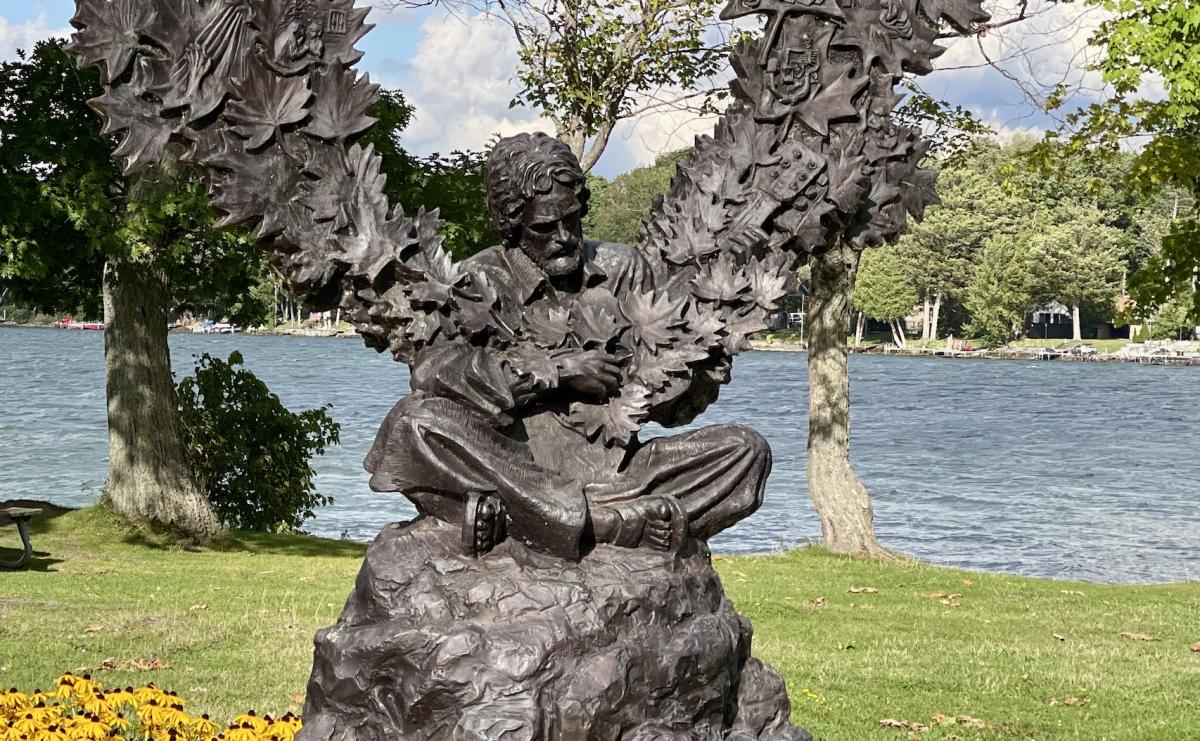In Orillia, a Canadian city in the province of Ontario, a unique monument stands on a point of land surrounded by the fresh waters of expansive Lake Simcoe. The monument celebrates the songs of Gordon Lightfoot, the famed native troubadour of that city who died this week at 84.

The statue is surrounded by a wreath of maple leaves, many of which are etched with scenes from Lightfoot’s more famous songs. Below, a larger and separate leaf sculpture memorializes Lightfoot’s song Wreck of the Edmund Fitzgerald. The sculpture was created by Timothy Schmalz
In the center of a wreath of maple leaves, the bearded and sandaled Lightfoot statue sits cross-legged, cradling a six-string guitar. It’s not hard to imagine that this quintessential romantic hippie is singing one of his trademark melancholy songs: Sundown maybe, Rainy Day People, Song for a Winter’s Night or his classic If You Could Read My Mind.
“I don’t know where we went wrong but the feeling’s gone and I just can’t get it back.”
The girl he was singing to, of course, is no longer part of the scene.
“I walk away like a movie star who’s been burned in a three-way script.”
Many of us have shared these emotions at one time or another, and Lightfoot, like many successful artists, spent a folk-singing career tapping into those common bonds. In doing so, the singer/songwriter helped create the soundtrack for the lives of millions of baby boomers who came of age in the 1970s and 1980s.
Becky and I hiked a fine trail along the shore of Lake Simcoe to visit the monument late last summer. We were cruising on the Trent-Severn Waterway which passes through the expansive lake before eventually emptying into the 30,000 islands of Georgian Bay. Gordon’s a favorite on my phone’s playlist so I couldn’t pass up the opportunity to see how his hometown had honored him. Nice that the honor came while his fame was firmly established and he was still performing.
Georgian Bay is west of Lake Simcoe. North of and an offshoot of Lake Huron, it is part of the Great Lakes system shared by Canada and the US.
The lakes are known for their powerful winter storms, one of which spelled the doom of the coal freighter Edmund Fitzgerald, and all 29 members of its crew, in a sudden Lake Superior gale in November of 1975. Lightfoot ensured the lasting memory of that tragic event in his hauntingly beautiful ballad Wreck of the Edmund Fitzgerald.
We coastal dwellers, who watch the weather so closely, are fortunate to understand the language of boats running ahead of fair winds, and boats running toward protected harbors from threatening storms and winds. We are fortunate also that Lightfoot shared his singing and songwriting talent, and familiarity with the language of the waters, in many songs including one about Georgian Bay’s Christian Island.
Lightfoot’s poetry, in the song by the same name, captures the natural human longing and appreciation for safety and security, especially in the nervousness of uncertain times and places:
“She’s a good old boat and she’ll stay afloat
Through the toughest gale and keep smilin’,
But for one more day she would like to stay
In the lee of Christian Island.”
Dennis Forney has been a publisher, journalist and columnist on the Delmarva Peninsula since 1972. He writes from his home on Grace Creek in Bozman.




Barbara Denton says
Thanks for this article. A wonderful reminder of his music and better times.
Maureen Curry says
Thank you Dennis Forney; Gordon Lightfoot holds a special place in my musical repertoire as well.
Elizabeth Hott says
Thank you for noting Gordon Lightfoot’s passing. My husband and I became fans when we were first married, nearly 52 years ago. Hearing his beautiful lyrics still touches my heart.